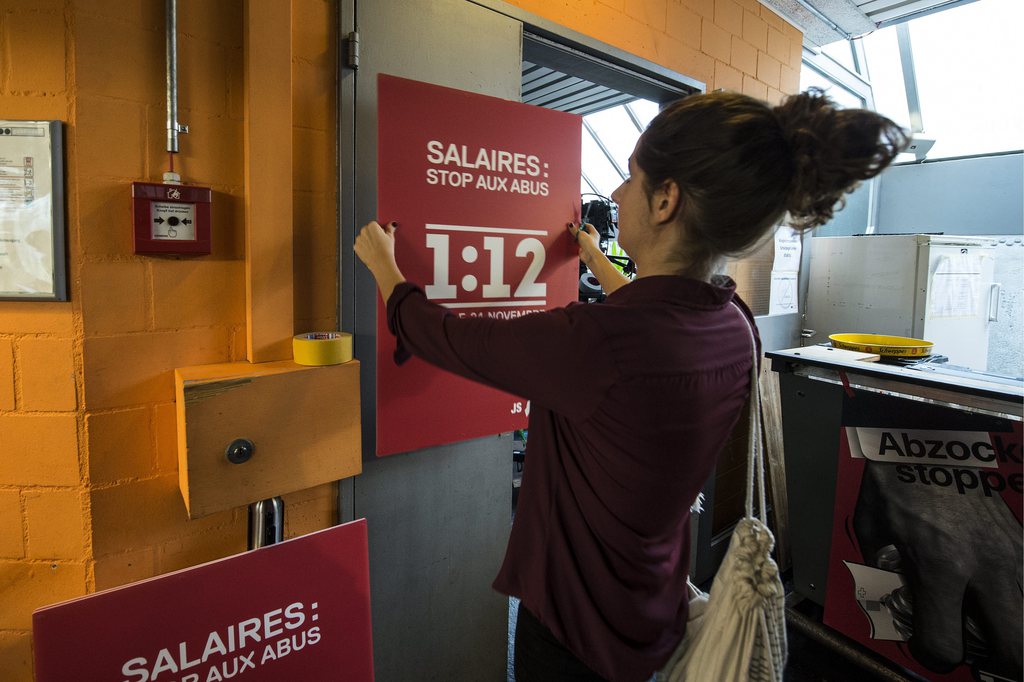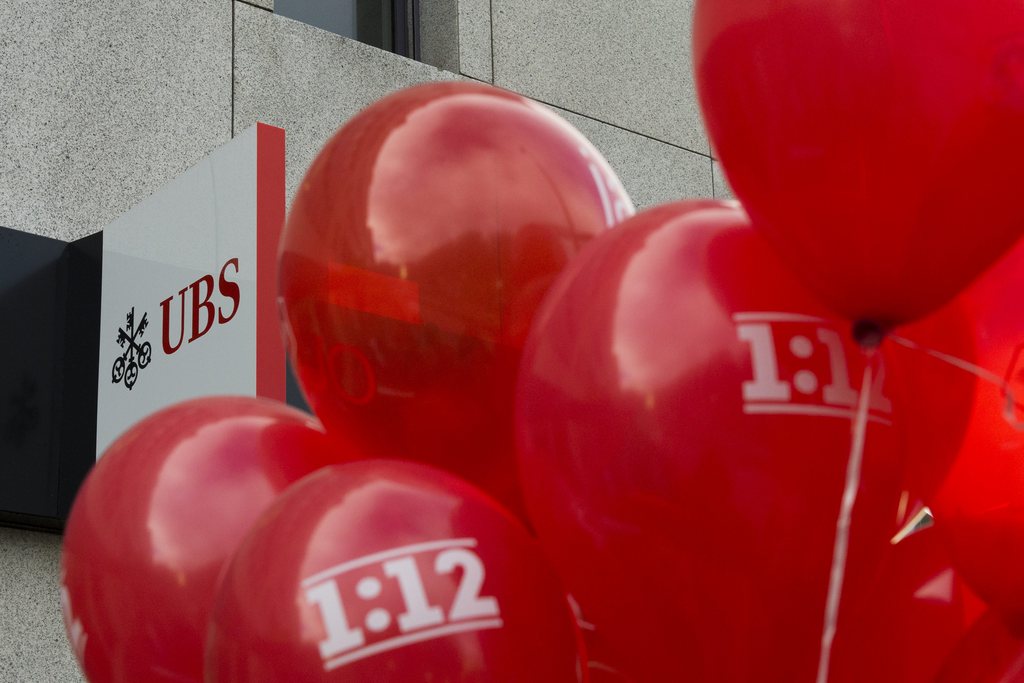Executive wage debate is far from over

Salaries remain at the top of the Swiss political agenda, even after voters decided on Sunday not to impose a limit on the discrepancy between the lowest and the highest salary paid by any given company.
Besides curbing exorbitant executive salaries, the unsuccessful 1:12 initiative was aimed at increasing lower pay rates. This is also the aim of another initiative “to protect fair pay”, launched by the Swiss Trade Union Federation, which is currently being studied by parliament. This would introduce a legal minimum wage of CHF22 ($24) per hour, which would mean about CHF4,000 per month.
The trade union initiative “would mean a total change in the way the lowest wages are set in Switzerland. Until now they were always negotiated between employer groups and unions at the sector and company level, depending on productivity and ability to pay”, says economist and social commentator Beat Kappeler.
“In Switzerland there is no tradition of government regulation of pay rates. What is more, it’s always difficult to pass an initiative that specifies precise figures,” notes Bernard Degen, a researcher in economic history at the University of Basel.
Debate on a minimum wage has, however, resulted in “greater awareness” of the issue of low wages, he thinks. Statistics show that in recent years the increase in low wage rates has been slightly superior to that of mid-to-low wages. On the other hand, the salaries that have seen the biggest gains are the ones that are high to begin with.
According to the most recent data published by the Federal Statistics Office, in 2010 in Switzerland the average gross salary for a full-time equivalent was CHF5,979 per month.
The monthly average gross salary of senior management was CHF10,189 in the private sector and CHF16,519 in the public sector (federal government). That of top managers was CHF22,755 in the private sector and CHF21,548 in the public sector.
One tenth of employees made less than CHF3,953 a month, and one tenth made more than CHF10,833.
Low-paid jobs that earn less than CHF3,986 for a full-time equivalent of 40 hours a week numbered about 275,000. The sectors most represented here are retail sales (55,200, or 20.1% of these jobs) and the restaurant trade (38,800, 14.1%). The highest proportion (61.8%) was in personal services (laundry, hairdressing).
Upward trend
In the Swiss retail sector, which has some of the country’s lowest pay rates, the major supermarket chains recently decided to raise their lowest wage rates.
The minimum monthly wage packet will increase to CHF4,000 at Lidl in December. In January it will rise to CHF4,200 at Aldi, CHF3,975 at Denner and CHF3,800 (plus a 13th-month bonus) at Migros and Coop. The monthly minimum at Aldi is already set at CHF4,112. Also increasing is the minimum wage for hairdressers, which will go up to CHF3,600.
Meanwhile, Neuchâtel cantonal government recently introduced a bill that would set a minimum wage of CHF20 an hour in the canton. It hopes this will come into force in 2015.
Neuchâtel would thus become the first canton to bring in a minimum legal wage. An initiative to this effect was approved by the canton’s voters two years ago. A similar initiative has since been passed by the people of canton Jura.
The current debate on a minimum legal wage in neighbouring Germany may also have an effect on the outcome of the Swiss vote. If the Germans go in this direction, it “would have an influence at least in German-speaking Switzerland, although the minimum wage in Germany is much lower”, according to Degen.
For Kappeler, however, “it might well incite people to reject the [Swiss] initiative, just because of the big difference in pay levels. If you compare our CHF22 with the minimum rates of our competitors, it becomes clear how much higher we are. In the US, the minimum wage is just over $7 (CHF6.40) and in Germany the minimum rate they are talking about at the moment is equivalent to about half of what is called for by the initiative” in Switzerland.
“But it needs to be said, too, that prices in Switzerland are among the highest in Europe,” says Rafael Lalive, professor of economics at the University of Lausanne. “It is in terms of purchasing power that this initiative should be considered.”
Strong feelings
One thing is sure: the minimum wage debate will be heavily determined by ideology.
“Responsible companies – and they are in the majority – are already paying higher minimum rates. If the employers’ groups were to decide to fight the initiative, it would be solely for ideological reasons,” Degen said.
Another likely battleground is the implementation of businessman-turned-politician Thomas Minder’s initiative “against rip-off salaries”, embraced by the voters last March.
This requires that the annual general meeting of shareholders vote on the amount of remuneration for the board, the executive and advisory body of any company listed on the Swiss stock exchange. It also forbids golden handshakes or advance payments to executives.
The Minder initiative was popular with a public angry with top managers of major companies who in recent years pocketed what were considered exorbitant pay and bonuses – the high-flyers benefited even when their companies were deep in the red. People now strongly expect implementation of the Minder initiative.
Watering down
Yet the regulations issued by the government on November 20, which are to come into force on January 1 pending the relevant legislation, have only served to reignite the debate. Supporters of the initiative are incensed at the watering down of several provisions.
In particular, these new regulations do not forbid sign-up bonuses for newly recruited talent or consulting contracts with top managers who leave the company, and it softens the penalties for breaking the rules. Thomas Minder himself thinks the time being given to companies to conform – two years – is excessive.
At any rate, the passage of the legislation to implement the so-called fat-cat initiative is likely to be rough. Minder has already warned that if the initiative is watered down too much, another one will be launched to make up for it.
(Translated from Italian by Terence MacNamee)

In compliance with the JTI standards
More: SWI swissinfo.ch certified by the Journalism Trust Initiative




You can find an overview of ongoing debates with our journalists here. Please join us!
If you want to start a conversation about a topic raised in this article or want to report factual errors, email us at english@swissinfo.ch.